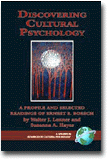
Discovering Cultural Psychology
A Profile and Selected Readings of Ernest E. Boesch
By:
Walter J. Lonner, Western Washington University
Susanna A. Hayes, Western Washington University
A volume in the series: Advances in Cultural Psychology: Constructing Human Development. Editor(s): Jaan Valsiner, Niels Bohr Professor of Cultural Psychology, Aalborg University.
Published 2007
This book is a landmark in contemporary cultural psychology. Ernest Boesch’s synthesis of ideas is the first comprehensive theory of culture in psychology since Wilhelm Wundt’s Völkerpsychologie of the first decades of the twentieth century. Cultural psychology of today is an attempt to advance the program of research that was charted out by Wundt—yet at times we are carefully avoiding direct recognition of such continuity. While Wundt’s experimental psychology has been hailed as the root for contemporary scientific psychology, the other side of his contribution— ethnographic analysis of folk traditions and higher psychological functions— has been largely discredited as something disconnected from the scientific realm. As an example of “soft” science—lacking the “hardness” of experimentation—it has been considered to be an esoteric hobby of the founding father of contemporary psychology. Of course that focus is profoundly wrong—the opposition “soft” versus “hard” just does not fit as a metalevel organizer of any science. Yet the rhetoric discounting the descriptive side of Wundt’s psychology is merely an act of social guidance of what psychologists do—not a way of creating knowledge.
CONTENTS
Series Editors’s Introduction: The Gracious Complexity of Culture: Striving Toward Humanity, Jaan Valsiner. Preface and Acknowledgments, Walter J. Lonner and Susanna A. Hayes. Introducing the Author of the Ideas: Getting to Know Ernest Boesch. Chronology of E. E. Boesch’s Life. Introduction Into Ideas: Experience, Method, and Dynamic Self: Prefatory Comments on Ernest E, Boesch’s Contributions to Cultural Psychology, Jürgen Straub and Arne Weidemann. PART I: ERNEST EDUARD BOESCH— THE JOURNEY OF DISCOVERY. The Early Years of E. E. Boesch. Preparing for a Professional Career: Ideological Growth and Searching. Symbolic Action Theory and its Applications The Authors in Collaboration with Ernest E. Boesch. Intermezzo: The Ernest Boesch I Knew a Half-Century Ago, Robert B. Textor. PART II: SELECTED READINGS. Introduction to the Selected Readings, The Authors. GETTING INTO ACTION. Introductory Comments to Chapter 5, The Authors. The Bangkok Project, Step One, Ernest E. Boesch. Introductory Comments to Chapter 6, The Authors. Space and Time as Valence Systems, Ernest E. Boesch. Introductory Comments to Chapter 7, The Authors. Cultural Psychology in Action-Theoretical Perspective, Ernest E. Boesch. B. THE REALITY OF BEAUTY. Introductory Comments to Chapter 8, The Authors. The Sound of the Violin, Ernest E. Boesch. Introductory Comments to Chapter 9, The Authors. Culture—Individual—Culture: The Cycle of Knowledge, Ernest E. Boesch. Introductory Comments to Chapter 10, The Authors. Reality as Metaphor, Ernest E. Boesch. C. MESSAGE THROUGH THE OTHER. Introductory Comments to Chapter 11, The Authors. The Seven Flaws of Cross-Cultural Psychology: The Story of a Conversion, Ernest E. Boesch. Introductory Comments to Chapter 12, The Authors. A Psychology of Concern, Ernest E. Boesch. Introductory Comments to Chapter 13, The Authors. Why Does Sally Never Call Bobby “I”? Ernest E. Boesch. Introductory Comments to Chapter 14, The Authors. The Enigmatic Other, Ernest E. Boesch. Introductory Comments to Chapter 15, The Authors. A Meditation on Message and Meaning, Ernest E. Boesch. Conclusions, The Authors. Complete Bibliography (Schriftenverzeichnis) of the Publications by Ernest E. Boesch. About the Authors.
-
Paperback978-1-59311-746-7
Web price: $62.04 (Reg. 72.99)
-
Hardcover978-1-59311-747-4
Web price: $89.24 (Reg. 104.99)
- eBook9781607526070

- EDU009000 - EDUCATION: Educational Psychology
- EDU037000 - EDUCATION: Research
- PSY000000 - PSYCHOLOGY: General
-
 Culture, Work and Psychology
Invitations to Dialogue
Culture, Work and Psychology
Invitations to Dialogue
-
 Deep Loyalties
Values in Military Lives
Deep Loyalties
Values in Military Lives
-
 Drama of Multilingualism
Literature Review and Liberation
Drama of Multilingualism
Literature Review and Liberation
-
 From Dream to Action
Imagination and (Im)Possible Futures
From Dream to Action
Imagination and (Im)Possible Futures
-
 Home in Transition
The Cultural Construction of Heimat
Home in Transition
The Cultural Construction of Heimat
-
 Making of Distinctions
Towards a Social Science of Inclusive Oppositions
Making of Distinctions
Towards a Social Science of Inclusive Oppositions
-
 Ornamented Lives
Ornamented Lives

